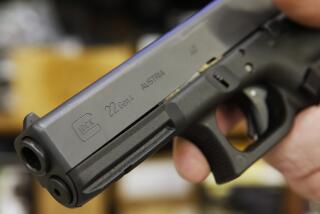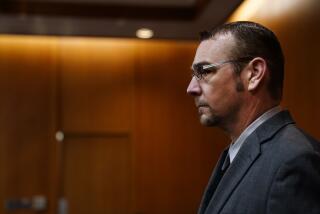Background no excuse for shooting classmate, prosecutor says
- Share via
It’s natural to feel sympathy for youthful murder defendant Brandon McInerney, who grew up in a home so violent and dysfunctional that he wasn’t even allowed to cry after his father punched him in the face. But the law does not allow for sympathy, prosecutor Maeve Fox told jurors Thursday during closing arguments in the teenager’s much-watched trial.
Emotionally, the case is a “tragedy on all levels,” Fox told the packed Chatsworth courtroom, but factually McInerney’s fatal shooting of a gay classmate in a junior high school computer lab is first-degree murder.
McInerney is accused of shooting Larry King twice point-blank in the head, dropping his weapon and walking out of a stunned Ventura County classroom in 2008. Prosecutors also added a hate crime charge, alleging that McInerney was a budding white supremacist. McInerney was 14 at the time; King was a year older.
“What possible chance did the boy have against this defendant?” Fox asked. “He was killed by someone who was full of hatred. “
Fox’s precise and focused three-hour presentation, complete with charts, photographs and bullet points of witness testimony, was followed by a more rambling closing argument from the defense.
McInerney attorney Scott Wippert emphasized his client’s age at the time of the shooting, his troubled home environment, teachers’ concerns about the growing tension after King started showing up at school in feminine attire, and the administration’s decision not to act on those concerns.
Wippert also suggested the prosecution was portraying McInerney as a “white supremacist monster” to buttress an unsupported hate crime allegation.
“This is a boy. He was 14,” Wippert said. “He wasn’t a man at a bar that somebody tried to pick up, and he waited outside to kill them.”
But Fox reminded jurors that after King said either “Love you, baby!” or “What’s up, baby!” in a school corridor, McInerney became angry and told a friend that he was going to bring a gun to school the next day.
Rather than cool off, Fox said, McInerney placed a .22 in his backpack the next morning, pulled out the weapon during a first-period class at E.O. Green Junior High in Oxnard and shot King in the back of the head.
Fox said defense arguments that McInerney was somehow provoked into the shooting by King’s aggressive flirtations or that he had endured a hellish childhood are smoke screens.
“No amount of revisionist history and attempts to paint Larry King as some kind of predator can ever change the fact of what occurred in this case,” she said. “That is: Larry King was executed for who he was.”
Fox urged jurors to set aside any bias they might have against King because he had told kids he was gay and was exploring a feminine gender identity.
“This victim, even in death, has been degraded and subjected to inappropriate character assassination,” she said. “No reasonable person of any age would ever have reacted the way the defendant did.”
Wippert said King was a troubled young man, “but he was also a victim of many other people. So was Brandon. The grown-ups failed. Everywhere. In both of their lives.”
Closing arguments in the eight-week trial are expected to conclude Friday.
catherine.saillant@latimes.com
More to Read
Sign up for Essential California
The most important California stories and recommendations in your inbox every morning.
You may occasionally receive promotional content from the Los Angeles Times.














